|
|
|
Sort Order |
|
|
|
Items / Page
|
|
|
|
|
|
|
| Srl | Item |
| 1 |
ID:
020743
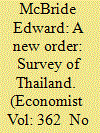

|
|
|
|
|
| Publication |
March 2, 2002.
|
| Description |
50
|
|
|
|
|
|
|
|
|
|
|
|
|
|
|
|
| 2 |
ID:
120249


|
|
|
|
|
| Publication |
Singapore, ISEAS, 2012.
|
| Description |
xvii,347p.pbk
|
| Standard Number |
9789814379649
|
|
|
|
|
|
|
|
|
|
|
|
Copies: C:1/I:0,R:0,Q:0
Circulation
| Accession# | Call# | Current Location | Status | Policy | Location |
| 057274 | 337.1/DAS 057274 | Main | On Shelf | General | |
|
|
|
|
| 3 |
ID:
166148
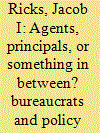

|
|
|
|
|
| Summary/Abstract |
In the aftermath of the 2006 and 2014 Thai coups, observers declared the resurrection of the bureaucratic polity. Bureaucrats, though, remained influential even during the period of 1992–2006, when elected politicians were thought to command the Thai state. Bureaucratic involvement in politics poses a challenge for dominant political science theories of politician–bureaucrat relationships, which draw heavily from principal–agent frameworks. I apply agency theory to Thailand, testing three different hypotheses derived from the theory. Examining legislative productivity and control over bureaucratic career trajectories, I find that elected politicians increasingly acted as principals of the Thai state from 1992 through 2006, and to a lesser degree from 2008 to 2013. Thai bureaucrats, though, have frequently engaged in the political sphere, blunting political oversight and expanding their independence vis-à-vis politicians. This suggests that the principal–agent model overlooks the range of resources that bureaucracies can bring to bear in developing countries, granting them greater autonomy than anticipated. As such, theories of the politician–bureaucrat relationship in developing states need to better account for the mechanisms through which bureaucrats exercise policy discretion and political influence.
|
|
|
|
|
|
|
|
|
|
|
|
|
|
|
|
| 4 |
ID:
184209
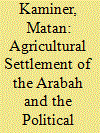

|
|
|
|
|
| Summary/Abstract |
Agricultural settlement geared to capitalist commodity production and accompanied by massive ecological interventions has historically been central to the Zionist colonial project of creating a permanent Jewish presence in the “Land of Israel.” The hyperarid southern region known as the Central Arabah is an instructive edge-case: in the 1960s, after the expulsion of the bedouin population, cooperative settlements were established here and vegetables produced through “Hebrew self-labor,” with generous assistance from the state. In the 1990s the region was again transformed as the importation of migrant workers from Thailand enabled farmers to expand cultivation of bell peppers for global markets. But today ecological destruction, depletion of water resources, and global warming cast doubt over the viability of settlement in this climatically extreme region. I locate the settlements of the Arabah within the historical political ecology of the Zionist movement, arguing that their current fragility exposes the essential precarity of capitalist colonization.
|
|
|
|
|
|
|
|
|
|
|
|
|
|
|
|
| 5 |
ID:
150560
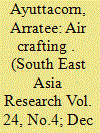

|
|
|
|
|
| Summary/Abstract |
This article explores the body politics of Thai female flight attendants, starting with the ways in which corporate mandates, training, and management seek to shape a standardized model of Thai female beauty. Workers are expected to comply with these mandates and some go to great lengths to conform. On the other hand, there are bodily practices which are outside the realm of these mandates which flight attendants also engage in, as they are not entirely complicit with management’s directives. Ultimately, the body politics of Thai female flight attendants lies at the nexus between corporate image, national ideology, and notions of gendered labour.
|
|
|
|
|
|
|
|
|
|
|
|
|
|
|
|
| 6 |
ID:
163112
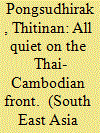

|
|
|
|
|
| Summary/Abstract |
That Thai-Cambodian relations are stable and peaceful after Thailand’s most recent military coup in 2014 is counterintuitive and inconsistent with recent trends and dynamics. When governments loyal to Thaksin Shinawatra took power over the past decade, bilateral relations were cordial and constructive. Conversely, when anti-Thaksin governments were in office, Thai-Cambodian relations became unstable and adversarial. But this has not been the case after the military regime under General Prayut Chan-ocha seized power and overthrew the Thaksin-aligned government of Prime Minister Yingluck Shinawatra. The dominant strand of scholarly explanations attributes the volatile bilateral relationship to Thai historical forces interacting with domestic politics, underpinned by a ‘national humiliation’ discourse dating to French imperialism. But such an informed understanding is unable to pinpoint the timing and extent of the bilateral conflict when it flared up. Synthesising overlapping streams of literature and drawing on select interviews, this article sets out to demonstrate that the post-coup Thai government’s commitment and resolve to prevail at all costs ahead of the royal succession and the incumbent Cambodian government’s weakened political legitimacy at home have combined to situate and normalise bilateral relations on a new plateau.
|
|
|
|
|
|
|
|
|
|
|
|
|
|
|
|
| 7 |
ID:
069036
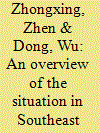

|
|
|
| 8 |
ID:
111143
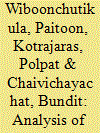

|
|
|
| 9 |
ID:
089370
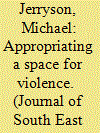

|
|
|
|
|
| Publication |
2009.
|
| Summary/Abstract |
In southern Thailand, monasteries once served as focal points for different communal identities to negotiate shared space and, with it, shared identities. However, since martial law was declared in 2004, Muslims in southern Thailand do not frequent monasteries. Instead, soldiers and police occupy monastery buildings and protect the perimeters from attacks. In addition, there are now military monks, soldiers who are simultaneously ordained monks, who work to protect the monasteries. This article argues that the Thai State's militarisation of monasteries and the role of Buddhist monks fuel a religious dimension to the ongoing civil war in southern Thailand.
|
|
|
|
|
|
|
|
|
|
|
|
|
|
|
|
| 10 |
ID:
190144
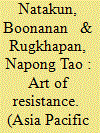

|
|
|
|
|
| Summary/Abstract |
The paper presents a case study of art activism in Nang Loeng, a historic neighbourhood in Bangkok, Thailand. Long recognised for its rich cultural heritage from food to architecture, Nang Loeng has established its name as a site of cultural tourism, drawing interest from tourists, artists, and professional experts. Like many neighbourhoods nearby, Nang Loeng today is being threatened by looming gentrification and eviction, as the inner city is transforming itself into a tourist destination. In particular, the upcoming underground construction has put their housing security under pressure. The paper first discusses the context of rail-led urban transformation in historic Bangkok, fuelled by the discourse of transit-oriented development. Then, it introduces Nang Loeng and their series of art-based programmes. Disappointed by their failure to secure housing tenure from the landlord, Nang Loeng residents have turned to activism as a tool of resistance. Here, the paper pays particular attention to the role of community architects who creatively translates neighbourhood concerns into artistic forms. Through the case of Buffalo Field Festival, the paper illustrates how the community architects, artists and local residents collaboratively use Nang Loeng's cultural assets to make subtle political statements.
|
|
|
|
|
|
|
|
|
|
|
|
|
|
|
|
| 11 |
ID:
140611


|
|
|
|
|
| Summary/Abstract |
The motivations for the birth of ASEAN were so that its members’ governing elite could concentrate on nation building, the common fear of communism, reduced faith in or mistrust of external powers in the 1960s, and a desire for economic development. In the international political scenario, the ASEAN is the successor of ASA (Association of Southeast Asia) which was formed in 1961. It consisted of a group of countries including Philippines, Malaysia, and Thailand.
|
|
|
|
|
|
|
|
|
|
|
|
|
|
|
|
| 12 |
ID:
191734
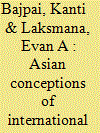

|
|
|
|
|
| Summary/Abstract |
How do major Asian states regard the current international security order? Do they agree or disagree among themselves? This is an introduction to a special section on ‘Asian conceptions of international order: what Asia wants’. It draws on articles analysing the stances of China, India, Japan, South Korea, Indonesia, Malaysia, Singapore, Thailand, Philippines and Vietnam towards the existing international security order usually described as a liberal international order (LIO). It argues that Asian states substantially support the main constitutive and regulatory norms and institutions of the LIO, but they worry that the LIO does not consistently honour these norms. Asians disagree on the centrality of political liberalism, but even Japan and South Korea, the most liberal states, are uncomfortable with strident criticism, punishment and the exclusion of less liberal states. Asians also disagree on the role of US alliances: some are strongly supportive, some are ambivalent and some are negative. Finally, Asians disagree on how they voice dissatisfaction. Japan and South Korea supplement existing norms and institutions as a way of transcending the limitations of the LIO; south-east Asian states promote ASEAN's mediatory role for peace and security above and beyond existing global arrangements; and Indonesia, India and China want to move from being norm takers to becoming norm shapers. The introduction ends with six policy implications.
|
|
|
|
|
|
|
|
|
|
|
|
|
|
|
|
| 13 |
ID:
154338
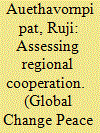

|
|
|
|
|
| Summary/Abstract |
Existing studies of Association of Southeast Asian Nations (ASEAN) states’ engagement with migrant worker rights focus on the experience of such workers from gender, labour and security perspectives. As such, these studies are yet to consider the broader impact of migrant worker rights on the process and nature of cooperation between ASEAN members. This article addresses this gap by framing migrant worker rights within the broader human rights socialization ongoing within Southeast Asia, driven by both members of ASEAN and external stakeholders. It argues that, contrary to many existing accounts of norms as creating shared commitments, migrant worker rights have led to considerable contestation, often driven by diverging national approaches to the issue. This article examines the impact of migrant worker rights norms on Thailand, the largest labour-recipient state in ASEAN. It asserts that Thailand’s diverging experience is caused by the lack of norm precision, resulting in the applicatory contestation of such norms.
|
|
|
|
|
|
|
|
|
|
|
|
|
|
|
|
| 14 |
ID:
074068
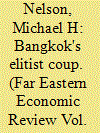

|
|
|
| 15 |
ID:
091978
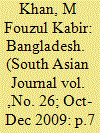

|
|
|
|
|
| Publication |
2009.
|
| Summary/Abstract |
The global recession could not have come at a less inopportune time for Bangladesh.The economy suffered shocks on both domestic and foreign fronts in FY08'. Domestically Bangladesh experienced two rounds of floods and was hit by the catastrophic major cyclone Sidr' which resulted in a huge loss of life and destruction of infrastructure, property and crops.
|
|
|
|
|
|
|
|
|
|
|
|
|
|
|
|
| 16 |
ID:
101086
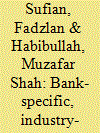

|
|
|
|
|
| Publication |
2010.
|
| Summary/Abstract |
This paper examines the efficiency of the Thai banking sector from 1999 to 2008 by using the data envelopment analysis (DEA) method. The results indicate that inefficiency in the sector stems mainly from scale rather than pure technical efficiencies. The findings suggest that small banks are most efficient, while medium-sized banks have been the least efficient banking group. Domestic banks have been relatively more efficient than their foreign bank peers, which can be attributed largely to a higher pure technical efficiency (PTE) level. The results from the multivariate regression analysis suggest that banks with higher loans intensity and which are relatively better capitalised tend to exhibit higher efficiency levels. On the other hand, credit risk is negatively related to bank efficiency. The empirical findings suggest that the recent global financial crisis exerts a negative impact on the efficiency of Thai banks.
|
|
|
|
|
|
|
|
|
|
|
|
|
|
|
|
| 17 |
ID:
165105
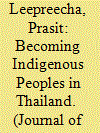

|
|
|
|
|
| Summary/Abstract |
This article investigates the processes of becoming Indigenous Peoples in Thailand by tracing the transnational relationships and influences of global Indigenous movements on the creation of the Network and the Council of Indigenous Peoples in Thailand (NIPT and CIPT). In addition, it examines the Indigenous Peoples’ movement toward both internal and external recognition. I argue that in Thailand the Indigenous Peoples movement stems from the global movement and exists in relation to international organisations. Within Thailand, the movement represents a deterritorialisation of the ethnoscape, with those now identified as Indigenous Peoples previously being identified as ‘tribal peoples’, ‘ethnic minorities’, or ‘Others’ who threatened national security. Indigenous Peoples are also self-identifying as native and marginalised peoples whose basic rights must be recognised and who advocate for equal treatment as citizens. Yet, the Indigenous Peoples’ movement in Thailand is developing through a process of ongoing negotiations with various internal and external sectors. As a Hmong anthropologist and long-time participant in the Indigenous movement in Thailand, in addition to secondary sources, I draw mainly on personal observations and interviews with key informants.
|
|
|
|
|
|
|
|
|
|
|
|
|
|
|
|
| 18 |
ID:
116223
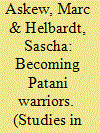

|
|
|
|
|
| Publication |
2012.
|
| Summary/Abstract |
Focusing on the case of Thailand's ongoing insurgency in its southern Malay Muslim majority region, this article examines the circumstances surrounding individual's choices to engage in violent revolt and their conformity and non-conformity with the norms and disciplines of the movement in which they operate. Insurgent-driven violence in Thailand's southern border provinces has attracted considerable attention, but little has been published about the people who become "Patani Warriors" (juwae). Based on the authors' direct encounters with current and former insurgents and study of Thai official documentation and captured insurgent propaganda material, this article presents the most detailed information currently available on southern Thailand's shadowy fighters. We argue that there is no single type of Malay Muslim insurgent: this variegated reality defies the normative ideals projected in insurgent's indoctrination material while it also poses a challenge for the Thai authorities to define in simple terms those who oppose the state.
|
|
|
|
|
|
|
|
|
|
|
|
|
|
|
|
| 19 |
ID:
142851
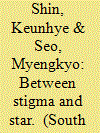

|
|
|
|
|
| Summary/Abstract |
In a hierarchical society, literature provides a window on the way in which culture governs the social – and sometimes political – construction of women's fidelity. This article explores how fidelity is socially embodied, regenerated and even imagined in literature by analysing two literary epics, Khun Chang Khun Phaen from Thailand and Chun Hyang Jeon from Korea. In analysing the two works side by side, the study examines the interplay between women and ruling ideologies. Focusing in particular on the heroines of the works, the authors assess why Wanthong, the heroine of Khun Chang Khun Phaen, is stigmatized as unfaithful in Thailand, whereas Chunhyang, the heroine of Chun Hyang Jeon, is a star and role model for righteous women in Korea.
|
|
|
|
|
|
|
|
|
|
|
|
|
|
|
|
| 20 |
ID:
093983
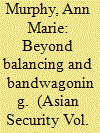

|
|
|
|
|
| Publication |
2010.
|
| Summary/Abstract |
This article examines Thailand's response to China's rise. Contrary to predictions made by power transition theories that states respond to rising powers by balancing against or bandwagoning with them, Thailand has reacted to China's rise with no fundamental change in its alignment posture. Thailand sees little threat but much opportunity in China's rise. Thailand is clearly not balancing; it has taken few measures to enhance its military capability or strengthen its alliance with the United States. This article argues that Thai policy can be classified as bandwagoning only under definitions that cannot be distinguished from foreign policy writ large. The policy implications of these findings are that the United States should not to take access to Thai bases or Thai support for a balancing coalition against China for granted.
|
|
|
|
|
|
|
|
|
|
|
|
|
|
|
|
|
|
|
|
|